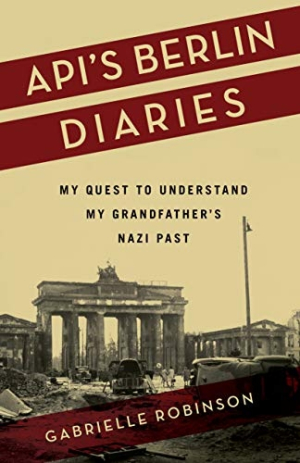Api's Berlin Diaries
My Quest to Understand My Grandfather's Nazi Past
As a record of post-war tribulation, Api’s Berlin Diaries is a poignant social history; as a search for an elusive, multifaceted grandfather, it’s a fascinating labyrinth.
In her eloquent memoir, Api’s Berlin Diaries, Gabrielle Robinson tries to reconcile her fond memories of her grandfather with German guilt.
As a child, Robinson seldom heard about her German family’s wartime experiences. The silence of the survivors went unquestioned. As an adult, she found Api’s diary, which he kept as an eye surgeon, and—to her astonishment—as a Nazi. This led her to a sensitive exploration of what it means to be burdened with the “sins of the fathers and grandfathers,” while acknowledging that such pain is a footnote amid the Holocaust.
Robinson considers how Api, who was raised with conservative Prussian values, joined the party “without the faintest guilt.” His biographical highlights, and bits of information about tumultuous, post-World War I Germany, are interspersed with Robinson’s memories. Fragments from Api’s diary in 1945 comprise the heart of the book, expanded through research to vivify the Soviet occupation and its ruinous aftermath. Api’s words reveal his anxiety about ever reuniting with his family, though otherwise, his diary passages are sparse.
Immediate concerns, from finding shelter to bureaucratic restrictions, rise to the forefront, alongside reflections on faith, gratitude, and nature’s balm. Api appears as a broken but persevering figure who was sustained by the thought of getting back to normal. His bewildering “denazification” process is intriguing, including classifications denoting how much a party member was involved, with “exonerated” representing the least; Api fell into that category as a former Wehrmacht officer, yielding a mixture of relief, but also continuing speculation, for Robinson.
Robinson’s trips to Berlin, whose modern topography is punctuated by remnants of the places that Api mentioned, reveal the war’s scars. Her trips to Suderburg and Bevensen, where she lived with Api and her grandmother after the war, reinforce warm memories of Api as a father figure. Between her forays into the past and her visits in the 2000s, her memories become complicated, with realistic gaps and shaded reactions to new discoveries.
At once reasoned, affecting, and ambivalent over Api’s silence about Jewish people, Robinson’s book avoids excusing earlier generations’ passivity, ingrained antisemitism, and tendency to turn inward. Colored by love, the book also evades judgment, while apt reflections from other writers, including Hannah Arendt, help to shed light on the thinking of the period. Robinson’s unanswerable questions about Api’s contradictions are presented in a forthright way, but the book’s closing chapters circle the issue of culpability without resolution.
This intricate family biography is a reminder that Nazis were not all high-ranking zealots. It makes the case that many ordinary people believed in the party’s early ideals and so never left it. Throughout, Api’s all-too-human emotions reinforce that every side suffers in a war, and that acknowledging this does not mitigate the facts.
As a record of post-war tribulation, Api’s Berlin Diaries is a poignant social history; as a search for an elusive, multifaceted grandfather, it’s a fascinating labyrinth.
Reviewed by
Karen Rigby
Disclosure: This article is not an endorsement, but a review. The publisher of this book provided free copies of the book and paid a small fee to have their book reviewed by a professional reviewer. Foreword Reviews and Clarion Reviews make no guarantee that the publisher will receive a positive review. Foreword Magazine, Inc. is disclosing this in accordance with the Federal Trade Commission’s 16 CFR, Part 255.

